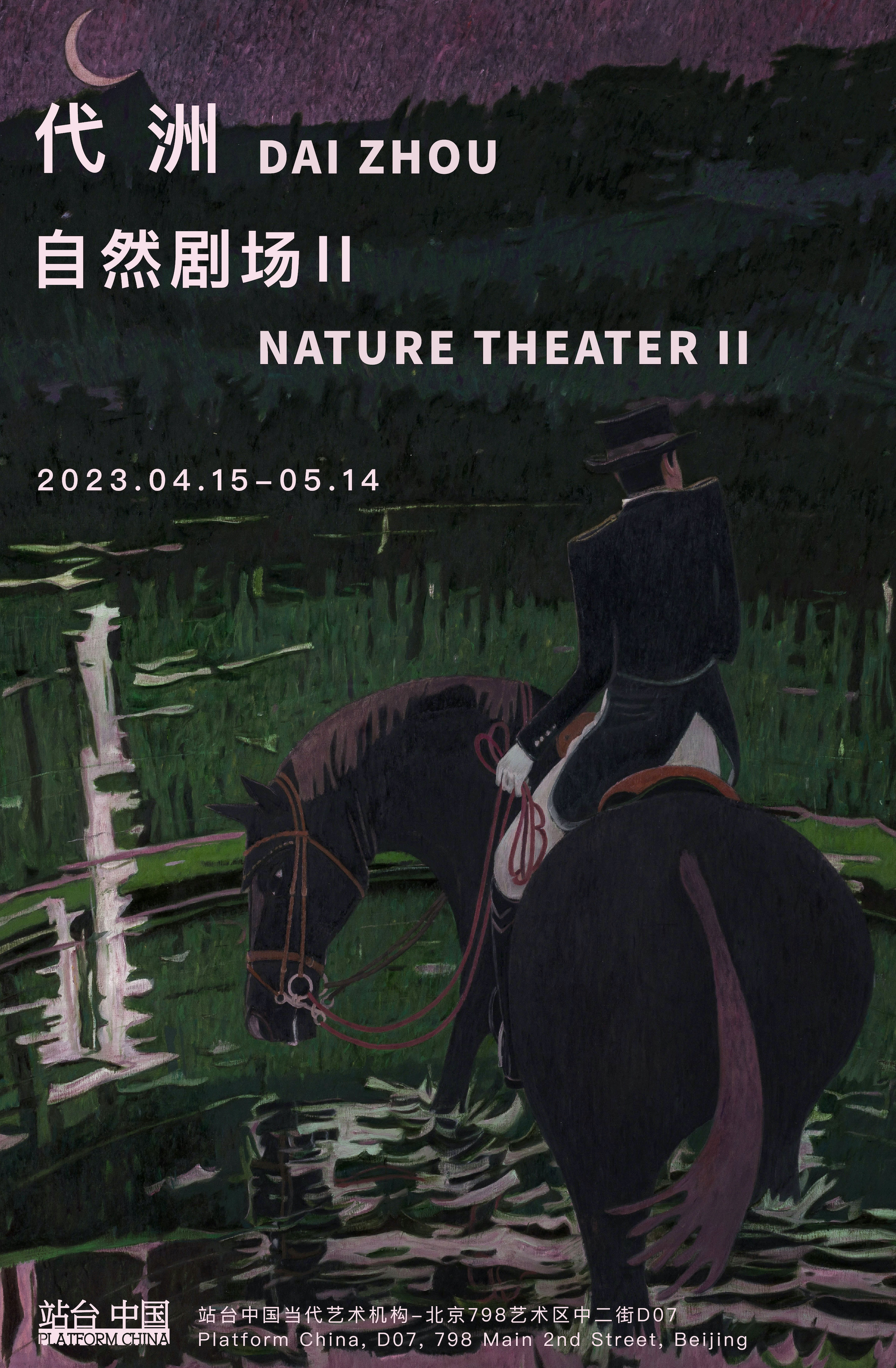
Platform China Contemporary Art Institute will open Dai Zhou's solo exhibition "Natural Theater II" on April 15 at Exhibition Space A, which will present the artist's recent works after his first solo exhibition "Natural Theater" in 2022.
"I like pictures full of imagination. My paintings are all staged in the theater I built. For example, there is moon during the daytime, heavy rain makes people hard to open eyes, but the moon is still clearly visible."
Dai Zhou
Dai Zhou described the conception of his picture as "a short period of time". Time gives room for the narrative to unfold, at the same time pushes the plot to an uncertain wait, intending to provide more information in the limited space. This exhibition seems to be about Macondo’s narrative. Lake, moon, night sky, beach, these unrealistic scenery appear in this fictional foreign land, lonely but romantic. They appear in turn under invisible guidance. We don't know where the horses and riders came from or where they are going. They pass through the thin or thick rain forest, each with their own thoughts, ambiguous, even gradually disappear into the landscape. Like an accidental plot, they happen at here, the narrative is also lost at here.
Beyond the imagination, derived from the pervasiveness of life in painting, Dai Zhou and his girlfriend ran a vintage clothing boutique in a century-old building on Yuyuan Road in Shanghai. For Dai Zhou, vintage clothes are an aesthetic styling, all exotic cultures are open without any burden. Integration, acceptance, and internalization are his ways to dealing with the external world. Dai Zhou will incorporate experience and intuition into his paintings, allowing the artist to enter different time and space in elsewhere. He observed that the color of light presented by different geographical latitudes also gradually changes. It gives him strong visual stimulation, and at the same time provides more forms and imagination for creation.
Dai Zhou’s works depend on initiative choice of themes. After amount of searching on social media, there must be something that particularly appeals to him repeatedly, maybe a tree, a line or a shape. They constitute choice and taste. For example, Dai Zhou is interested in horses, but he neither has a hobby nor knows how to ride a horse. His focus was not on equestrian, but on "the man who rode the horse." People have their own ideas, and horses also have their own ideas. They seem to be a whole, but they are separated, thinking about their own things.
And this self-expression is also a kind of shackles. In Dai Zhou’s perspective, the horse is bound. When decorative things such as bridles and saddles appear, it is firmly tied up. Just like people decorate themselves with various accessories to form their personality, but also firmly bound by these things. When trying to get rid of some existing connections, the external labels put on to prove the difference also bring new constraints, which is a cycle. We cannot get rid of the existence of relationship, the relationship itself is eternal.
When faced with an organic combination, we always subconsciously look for the connection among them, believing that it is the commonality that makes the group unite, and there must be a thin thread running through it. But in Dai Zhou's paintings, he always tries to separate all combinations. Horse and its rider are not have tacit agreement, the moon and the sky are also separate, each actor who appears is an independent individual, they are just put together, there is no strong commonality, and they seem to have their own thoughts. And this is exactly the choice of people in the current era: the voice of the individual is gradually enlarged, and the necessity of the group is gradually reduced, which may also be a new consensus.
If the landscape in landscape paintings is viewed, then in Dai Zhou's paintings, the landscape is the subject of watching protagonists, it becomes a spectator. The artist constructs a private theater for us, where nature no longer happens independently, but belongs to human choice. Just like the everlasting crescent in the picture, it is not affected by the outside world and will not undergo major changes. It seems to be observing everything below. It is like a symbol, and also like the rain that only falls on Truman's head in the movie "The Truman Show". Even the moon itself, which is only a small beam of light, but has such a huge shadow on the ripples that it obscures everything on the surface of the lake.
"I find my precious color at night.” Dai Zhou expressed it in his solo exhibition "Natural Theater" last year, and he brought "night" to the edge of the city in "Natural Theater II". The nature from life and the fictional foreign land of literature intersect here, and the play bill also strips off the artist's personal narration one after another, exploring fresh land and order in the imaginary space and climbs up the stairs. As Dai Zhou said: “This is a kind of human and nature living in a theater. Everything is arranged, and I prefer the power in silence”.
By Yu Chang